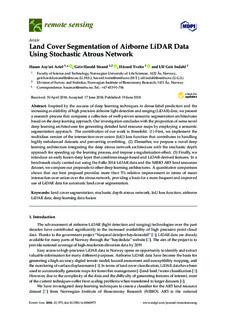| dc.contributor.author | Arief, Hasan Asyari | |
| dc.contributor.author | Strand, Geir-Harald | |
| dc.contributor.author | Tveite, Håvard | |
| dc.contributor.author | Indahl, Ulf Geir | |
| dc.date.accessioned | 2019-01-15T17:18:59Z | |
| dc.date.available | 2019-01-15T17:18:59Z | |
| dc.date.created | 2018-06-19T14:15:23Z | |
| dc.date.issued | 2018 | |
| dc.identifier.citation | Remote Sensing. 2018, 10 (6), . | nb_NO |
| dc.identifier.issn | 2072-4292 | |
| dc.identifier.uri | http://hdl.handle.net/11250/2580755 | |
| dc.description.abstract | Inspired by the success of deep learning techniques in dense-label prediction and the increasing availability of high precision airborne light detection and ranging (LiDAR) data, we present a research process that compares a collection of well-proven semantic segmentation architectures based on the deep learning approach. Our investigation concludes with the proposition of some novel deep learning architectures for generating detailed land resource maps by employing a semantic segmentation approach. The contribution of our work is threefold. (1) First, we implement the multiclass version of the intersection-over-union (IoU) loss function that contributes to handling highly imbalanced datasets and preventing overfitting. (2) Thereafter, we propose a novel deep learning architecture integrating the deep atrous network architecture with the stochastic depth approach for speeding up the learning process, and impose a regularization effect. (3) Finally, we introduce an early fusion deep layer that combines image-based and LiDAR-derived features. In a benchmark study carried out using the Follo 2014 LiDAR data and the NIBIO AR5 land resources dataset, we compare our proposals to other deep learning architectures. A quantitative comparison shows that our best proposal provides more than 5% relative improvement in terms of mean intersection-over-union over the atrous network, providing a basis for a more frequent and improved use of LiDAR data for automatic land cover segmentation. | nb_NO |
| dc.description.abstract | Land cover segmentation of airborne LiDAR data using stochastic atrous network | nb_NO |
| dc.language.iso | eng | nb_NO |
| dc.rights | Attribution-NonCommercial-NoDerivatives 4.0 Internasjonal | * |
| dc.rights.uri | http://creativecommons.org/licenses/by-nc-nd/4.0/deed.no | * |
| dc.title | Land cover segmentation of airborne LiDAR data using stochastic atrous network | nb_NO |
| dc.type | Journal article | nb_NO |
| dc.type | Peer reviewed | nb_NO |
| dc.description.version | publishedVersion | nb_NO |
| dc.source.pagenumber | 22 | nb_NO |
| dc.source.volume | 10 | nb_NO |
| dc.source.journal | Remote Sensing | nb_NO |
| dc.source.issue | 6 | nb_NO |
| dc.identifier.doi | 10.3390/rs10060973 | |
| dc.identifier.cristin | 1592336 | |
| cristin.unitcode | 192,15,6,0 | |
| cristin.unitcode | 192,15,3,0 | |
| cristin.unitcode | 192,15,1,0 | |
| cristin.unitname | Seksjon for realfag og teknologi | |
| cristin.unitname | Seksjon for geomatikk | |
| cristin.unitname | Seksjon for anvendte matematiske fag | |
| cristin.ispublished | true | |
| cristin.fulltext | original | |
| cristin.qualitycode | 1 | |

